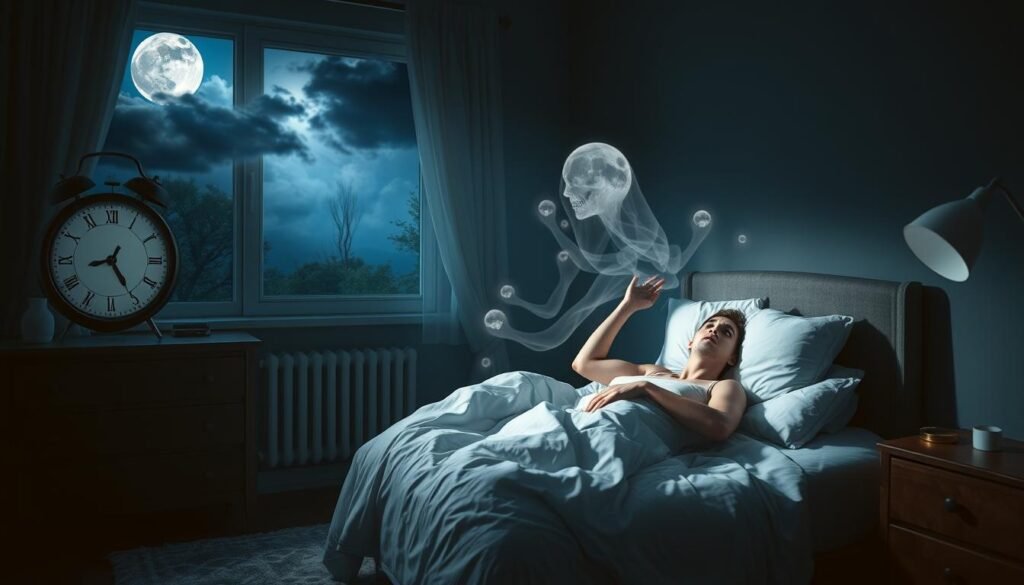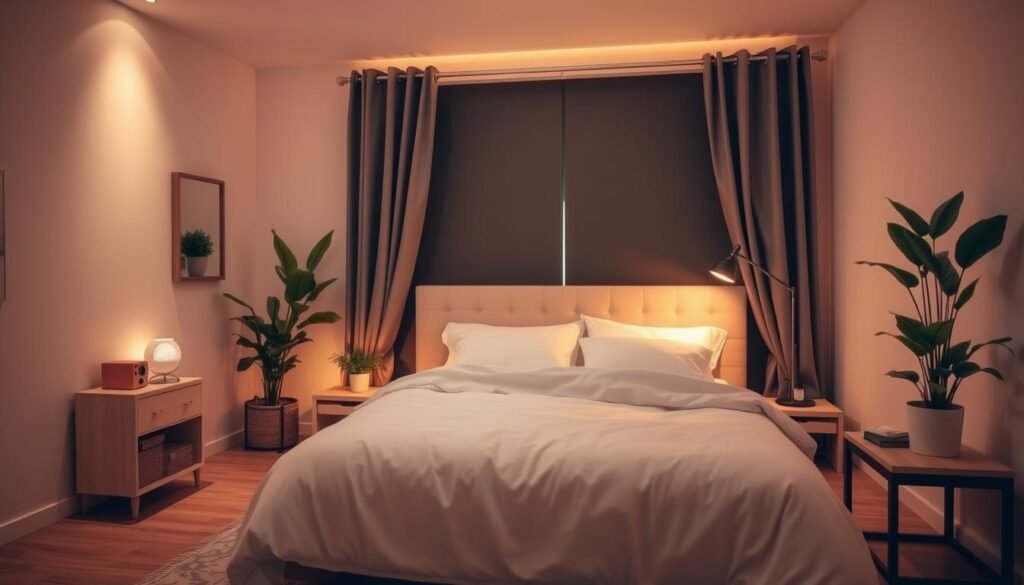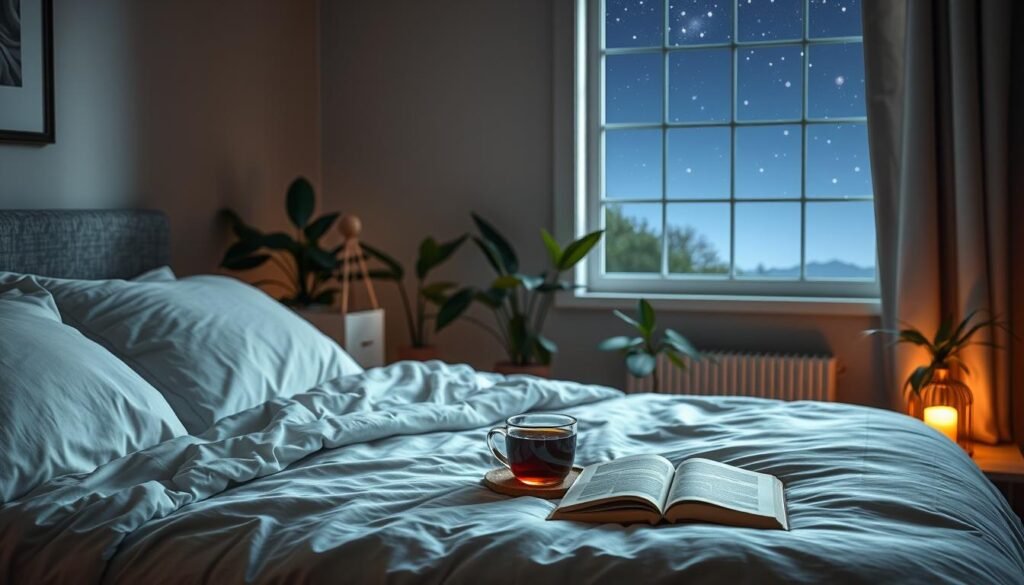Did you know about 20% of American adults have anxiety disorders? This fact shows a big problem that makes it hard for many to sleep well. Sleep anxiety affects many, especially those with depression or mental health issues. It’s important to understand and deal with sleep anxiety. This helps you sleep better and improves your life. We’ll share expert advice and ways to beat sleep anxiety in this article.
Key Takeaways
- Nearly 20% of U.S. adults experience anxiety disorders, impacting sleep quality.
- Over 90% of individuals with PTSD report insomnia.
- Regular exercise and proper sleep hygiene are essential for anxiety management.
- Establishing a relaxing bedtime routine can combat sleep anxiety.
- Mindfulness practices like yoga and meditation effectively reduce stress hormones.
Understanding Sleep Anxiety
Sleep anxiety is when people worry a lot about not being able to sleep well. It means being scared of not sleeping and how that fear affects life. This worry can make sleep worse and lead to more health problems.
Defining Sleep Anxiety
Sleep anxiety links closely with anxiety disorders. Those with it fear not sleeping. They think this may point to bigger issues. It often exists alongside other anxiety conditions, making night times harder.
Common Symptoms
Sleep anxiety shows up in different ways. It can greatly upset someone’s life. Symptoms include:
- Difficulty falling asleep
- Frequent awakenings during the night
- Excessive worry regarding sleep quality
- Intrusive thoughts that hinder relaxation
- Increased heart rate or panic during nighttime
It’s important to recognize these symptoms. Knowing them helps in treating and coping better.
| Symptoms of Sleep Anxiety | Impact on Daily Life |
|---|---|
| Difficulty falling asleep | Increased fatigue and irritability |
| Frequent awakenings | Poor concentration and low productivity |
| Excessive worry | Heightened stress levels |
| Intrusive thoughts | Reduced enjoyment in daily activities |
Identifying Sleep Anxiety
Recognizing sleep anxiety is about noticing key signs. Many find it hard to sleep due to constant worry and anxious thoughts. It’s vital to identify sleep anxiety by these signs. These issues can ruin a good night’s sleep.
Key Indicators of Sleep Anxiety
Common indicators of sleep anxiety include:
- Restlessness at bedtime
- Increased heart rate and sweating when trying to sleep
- Panic attacks or feelings of dread associated with sleep
- Frequent nighttime awakenings accompanied by racing thoughts
Heart palpitations and shortness of breath are also common. These signs can prevent a calm sleep. This can start a cycle of anxiety and bad sleep.
Differentiating from Other Sleep Issues
It’s important to tell sleep issues apart. Sleep anxiety looks like other conditions, for example, insomnia or sleep apnea. While some disturbances are short and due to stress, others face long-term sleep anxiety. Knowing the difference helps in finding the right treatment.
Maintaining a steady sleep routine and practicing relaxation can help improve sleep. For more help and tips, visit this article.
Understanding the Causes of Sleep Anxiety
To understand causes of sleep anxiety, we look at stress, mind influences, and life choices. These factors intertwine, disturbing sleep and making anxiety worse.
The Role of Stress
Stress is a big factor behind sleep anxiety. It leads to constant worry that messes with sleep. Life’s pressures and shocks heighten anxiety, messing up sleep. Studies show a strong link between insomnia and anxiety disorders.
Psychological Factors Contributing to Anxiety
Mental habits also impact sleep anxiety. Thoughts of worry or stress before sleep harm mental calmness. Issues like anxiety, depression, or PTSD can increase sleep anxiety. Treating these psychological factors helps improve sleep quality.
Identifying Lifestyle Triggers
Many daily habits can affect sleep, leading to anxiety. Key triggers include too much screen time, caffeine, and inconsistent sleep routines. Keeping a regular schedule and limiting caffeine before bed can help. Being active and eating well also boost sleep quality, tackling the cycle of anxiety and poor sleep.
| Trigger Type | Examples | Impact on Sleep |
|---|---|---|
| Stress | Work pressure, family issues | Difficulty falling asleep, frequent awakenings |
| Psychological Factors | Generalized anxiety, PTSD | Increased anxiety at night, fear of sleep |
| Lifestyle Triggers | Caffeine, screen time | Reduced sleep quality, longer sleep onset |
Sleep Disorders and Their Connection to Sleep Anxiety
The link between sleep disorders and sleep anxiety is clear in many people. Different issues like insomnia, sleep apnea, and restless legs syndrome often come with anxiety. Understanding these relationships highlights the impact of insomnia on mental well-being. This understanding leads to better treatments.
Common Sleep Disorders Associated with Anxiety
Many people dealing with anxiety face sleep disorders. Insomnia is a common example, affecting one in three adults worldwide. It is when you struggle to sleep or stay asleep at least three times a week for over three months. Chronic insomnia really affects one’s daily life.
- Sleep Apnea: Research shows people with obstructive sleep apnea are more likely to have anxiety, panic attacks, and depression.
- Restless Legs Syndrome: This problem can ruin sleep quality, making it hard to rest without feeling anxious.
- Somniphobia: A deep fear of sleeping, often because of ongoing nightmares, is seen in adults and children with PTSD.
Impact of Insomnia
The sleep anxiety connection is clear in how anxiety and insomnia affect each other. Anxiety can make it hard to sleep, and not sleeping well makes anxiety worse. Being very alert and having too many thoughts from anxiety can stop you from resting. This cycle makes things worse. Not sleeping enough can make you easily annoyed, have mood changes, and not manage stress well. This just adds to the anxiety.
Finding ways to deal with these issues is crucial for good health. CBT works well for treating anxiety and insomnia together. It helps improve sleep quality. Also, having good sleep habits, like sleeping at the same time, not using stimulants, and relaxing before bed, helps reduce sleep-related anxiety. To learn more about how anxiety and sleep problems are connected, check out this useful resource.

Creating a Sleep-Friendly Environment
Making your room sleep-friendly is key to better sleep. Factors like noise, room temperature, and how clean your room is play big roles. For better sleep, keep your bedroom at 65 degrees Fahrenheit (18.3 degrees Celsius).
Noisy environments can break your sleep cycle. This can harm your health. To make your room peaceful, try soundproofing or a white noise machine.
The right lighting is also crucial for good sleep. Light levels over 10 lux at night can disrupt your sleep. Use soft, dim lights before bed to help you relax.
Keeping your bedroom clean makes it more relaxing. Wash your sheets every two weeks to keep dust and allergens away. Clean bedding helps you sleep better and feel refreshed in the morning.
Adding calming scents like lavender can also improve sleep. A peaceful room helps your body relax and get ready for sleep.
To create a sleep-friendly room, focus on temperature, noise, light, and cleanliness. Using soothing scents helps too. For more tips on improving your sleep space, check out this helpful resource.
Optimizing Your Bedroom for Better Sleep
For better sleep, creating a restful environment is key. It can really change how you feel at night. By looking at different parts of the bedroom, you can sleep better and improve your sleep habits.
Essential Adjustments to Consider
When making your bedroom better for sleep, think about these things:
- Temperature: Keeping your bedroom around 65°F helps you sleep better. It makes the room comfortable for resting.
- Mattress: A mattress that’s medium-firm is usually the best choice. It’s wise to get a new one every seven years for good support.
- Bedding: The right sheets, blankets, and pillows matter a lot for your sleep. Natural fabrics like cotton or bamboo keep warm sleepers comfy.
- Light Control: Blackout curtains or masks block extra light. This is needed for a dark place to sleep.
- Sound Management: Earplugs or white noise machines can cover up loud sounds. They help you have a quieter night.
Importance of Sleep Hygiene
Keeping your bedroom clean and tidy is important for a calming sleep space. New, fresh bedding can make a big difference in sleep quality. A neat place lowers stress and helps you relax. Try to stay away from screens before bed since the blue light makes it harder to fall asleep.
For better sleep advice, designing the perfect bedroom is key. These changes help with sleep hygiene and feeling good overall.

Implementing Relaxation Techniques in Sleep Anxiety Treatment
Relaxation techniques can change how we manage sleep anxiety. They help calm our minds, lower stress, and get us ready for sleep. Learning to use deep breathing, progressive muscle relaxation, and mindfulness can improve how well we sleep.
Deep Breathing Exercises
Deep breathing is a powerful way to reduce stress and calm down. Box Breathing is one method. You breathe in for 4 counts, hold for 4 counts, and breathe out for 4 counts. This slows down your heart and helps you relax. The 4-7-8 technique is another way to control your breath and feel calm.
Progressive Muscle Relaxation
This technique is about tensing and then relaxing your muscles. It helps you notice how your body feels and lessens stress. By focusing on different muscles, you can ease tension and rest better. It works well with other methods, like guided visualization.
Mindfulness Meditation Practices
Mindfulness meditation helps you focus on the here and now. Techniques like guided imagery use your senses to create a peaceful mind space. This can make you feel relaxed and clear-headed. Yoga nidra, a specific meditation, focuses on calming the mind for better sleep. Regularly practicing mindfulness can cut down on worrying thoughts that make sleep hard.
| Technique | Benefits | Practice Method |
|---|---|---|
| Deep Breathing | Reduces heart rate and stress levels | Box Breathing or 4-7-8 Technique |
| Progressive Muscle Relaxation | Alleviates physical tension | Tensing and relaxing muscle groups |
| Mindfulness Meditation | Promotes present-moment awareness | Guided Imagery or Yoga Nidra |
Using these relaxation methods regularly can lower stress hormones. This makes you feel better and sleep more soundly. Adding these techniques to your bedtime routine can help if you have trouble sleeping.
Adopting Healthy Habits to Improve Sleep Quality
Starting healthy habits to get better sleep is key. This is very important for people who find it hard to sleep. Knowing how exercise and eating right help you sleep better is beneficial.
The Impact of Regular Exercise
Exercise is a great way to fight off anxiety and sleep better. Activities like walking or yoga help you feel calmer. They make it easier to fall asleep. Exercise also keeps your sleep-wake cycle on track.
- Improves mood and reduces anxiety.
- Promotes energy balance.
- Improves sleep duration and quality.
- Helps regulate circadian rhythms.
Balanced Diet Contributions
Eating right also leads to better sleep. A mixture of good food boosts brain health and sleep patterns. It’s good to avoid things like coffee and alcohol before bed. Eating foods that are good for sleep is smart.
| Food Type | Benefits for Sleep |
|---|---|
| Complex Carbohydrates | Promote serotonin production to induce calmness. |
| Lean Proteins | Provide tryptophan, essential for melatonin production. |
| Fruits and Vegetables | High in vitamins and antioxidants that support overall health. |
| Nuts and Seeds | Rich in magnesium, which can help improve sleep quality. |

Limiting Screen Time for Better Sleep
Many studies link too much screen time to bad sleep in kids and teens. Around 30% of young ones don’t get enough sleep because of screens in bedrooms. This has been proven in nearly 90% of research done.
Most American kids have a device in their bedroom. Also, 60% use them right before bed. This can lead to poor sleep and mood problems. Kids who don’t get enough sleep may face more emotional and behavioral issues.
Too much screen time can cause anxiety and depression, making it harder to sleep. For each extra hour on screens, kids might lose 10 minutes of sleep. No tech before bed can really help improve sleep. Experts say different ages need different amounts of sleep to be their best.
But we can make changes that help a lot:
- Limit how long screens are on each day.
- Make areas in the house where screens aren’t allowed.
- Do things without screens before bedtime.
- Have screen-free family time.
These steps can cut screen time, make sleep better, and help kids feel happier. Less screen time means more melatonin, which we need for good sleep and feeling well.
| Age Group | Recommended Sleep Duration | Consequences of Insufficient Sleep |
|---|---|---|
| Newborns (0-3 months) | 14-17 hours | Developmental issues |
| Toddlers (1-2 years) | 11-14 hours | Behavioral and emotional problems |
| Preschoolers (3-5 years) | 10-13 hours | Learning difficulties |
| School-age children (6-13 years) | 9-11 hours | Impaired focus, weight gain |
| Teens (14-17 years) | 8-10 hours | Increased risk of emotional problems |
Changing screen habits is key to sleeping and feeling better, for kids and teens alike.
Conclusion
Addressing sleep anxiety needs a whole plan. It includes various strategies for good sleep. Those with sleep anxiety gain a lot from setting up the right sleep space. They also benefit from relaxation techniques and healthy living habits. Using psychological knowledge, these ways can make sleep quality better. This helps people deal with their sleep problems.
Studies show that cognitive-behavioral therapy (CBT) really helps with sleep issues caused by anxiety. It has a moderate effect size of 0.53. This means that therapy techniques can majorly improve sleep anxiety if used right. Also, it’s important to know that anxiety affects sleep in different ways. For example, people with Major Depressive Disorder often have more sleep problems. This shows why we need a full plan for treatment.
In the end, by using these methods, people can better handle sleep anxiety. Knowing about therapy options like CBT and changes in lifestyle is key. It opens a way toward improved sleep and a better life.